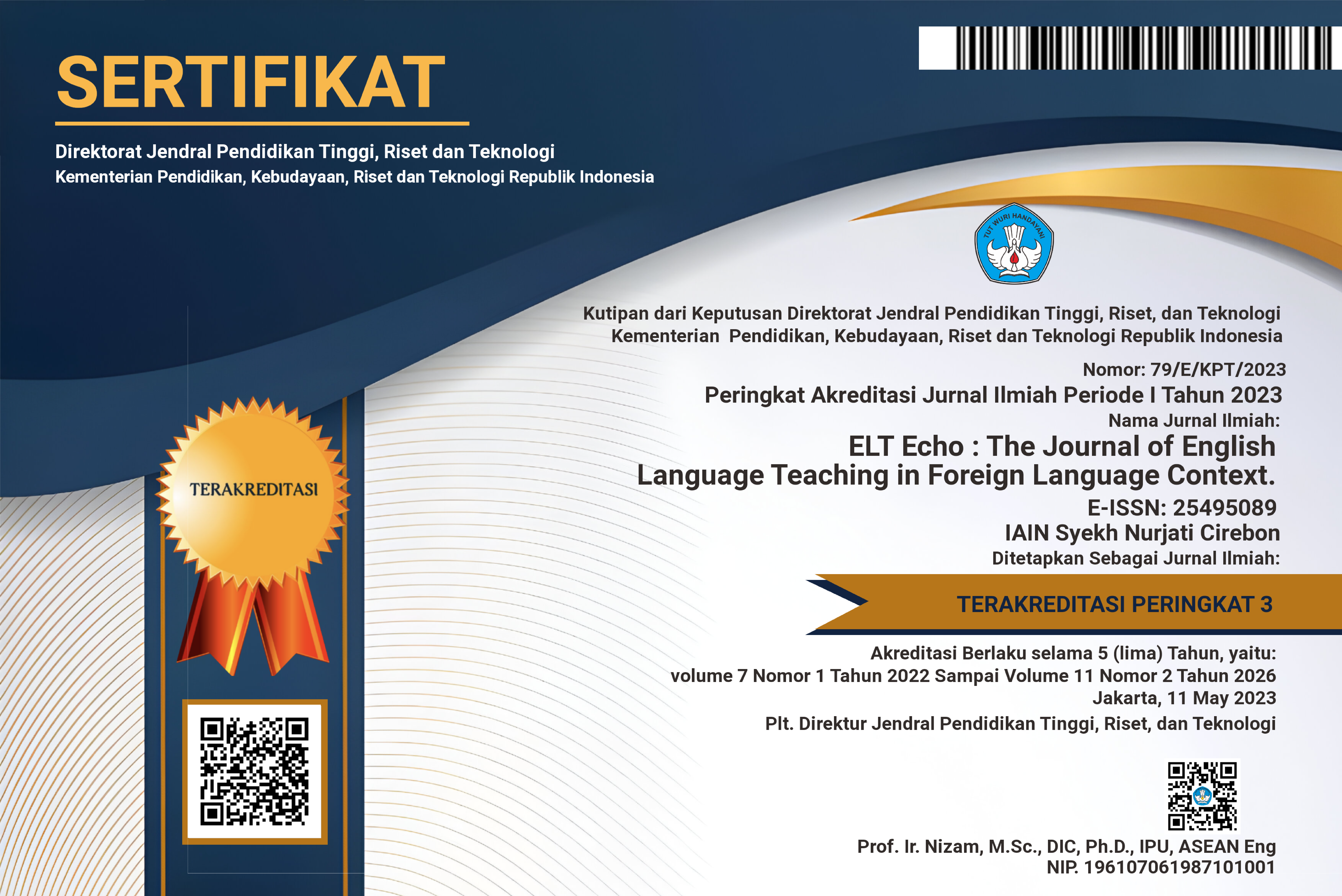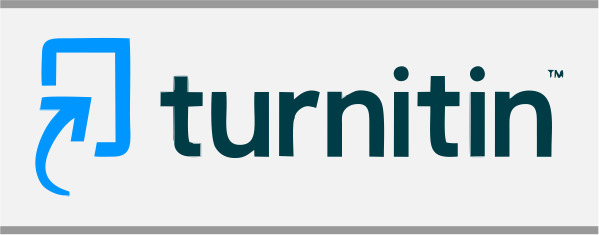THE ROLE OF TIKTOK APPLICATION TO LEARN ENGLISH VOCABULARY: A SURVEY ON STUDENT TEACHERS
(1) Universitas Tidar
(2) Universitas Negeri Yogyakarta
(*) Corresponding Author
Abstract
Keywords
Full Text:
PDFReferences
Alauddin, M. F. (2023). Junior High School Students’ Perceptions of Learning Tenses Through the Tiktok Application. ELTICS : Journal of English Language Teaching and English Linguistics. https://doi.org/10.31316/eltics.v8i1.4565
Alghameeti, A.A. (2022). Is TikTok an Effective Technology Tool in English Vocabulary Expansion? English Language Teaching. https://doi.org/10.5539/elt.v15n12p14
Arif, T. Z. Z. Al. (2019). The Use of Social Media for English Language Learning: An Exploratory Study of EFL University Students. Metathesis: Journal of English Language, Literature, and Teaching.
Armanda, M. L., & Yosintha, R. (2022). THE ROLE OF CRITICAL DIGITAL LITERACY IN FOREIGN LANGUAGE LEARNING: A SURVEY ON YOUNG LEARNERS. ETERNAL (English, Teaching, Learning, and Research Journal). https://doi.org/10.24252/eternal.v81.2022.a11
Bernard, A. V. (2021). Expanding ESL Students’ Vocabulary Through TikTok Videos. Lensa: Kajian Kebahasaan, Kesusastraan, Dan Budaya. https://doi.org/10.26714/lensa.11.2.2021.171-184
Br Perangin angin, E. F. S., Silaban, M. C. A., & Purba, R. (2021). Improving Student’s Listening Skills Using Tiktok at SMP Swasta Amalyatul Huda Medan. Jurnal Ilmiah Profesi Pendidikan. https://doi.org/10.29303/jipp.v6i4.312
Erwani, I., Romi, M. J., Sawithy, M. N., Rohana, R., Ulfah, S., & Supeni, I. (2022). The Influence of Tiktok in Increasing Vocabulary for Elementary School in SMP 1 Muhammadiyah Banjarbaru. Elite Journal.
Erzad, A. M., & Suciati, S. (2018). Social Media for Improving Students’ English Quality in Millenial Era. Edulingua: Jurnal Linguistiks Terapan Dan Pendidikan Bahasa Inggris.
Fahdin, R. G. P. (2020). Student’s Perception toward The Use of Tik Tok in Learning English Vocabulary. Khazanah: Jurnal Mahasiswa. https://doi.org/10.20885/khazanah.vol12.iss2.art47
Fromm, J., & Read, A. (2021). Marketing To Gen Z. Amacom.
Handayani, R. D., Syafei, M., & Utari, A. R. P. (2020). THE USE OF SOCIAL MEDIA FOR LEARNING ENGLISH. Prominent. https://doi.org/10.24176/pro.v3i2.5381
Hanim, S. (2021). Social Media Usage for Learning English Language. Randwick International of Education and Linguistics Science Journal. https://doi.org/10.47175/rielsj.v2i3.289
Harun, F. G., Pelenhaku, N., & Olii, Sanerita, T. (2022). Students’ Perception of Social Media To Learn English. JoTELL : Journal of Teaching English, Linguistics, and Literature.
Herlisya, D., & Wiratno, P. (2022). Having Good Speaking English through Tik Tok Application. Journal Corner of Education, Linguistics, and Literature. https://doi.org/10.54012/jcell.v1i3.35
Katemba, C. V. (2022). Vocabulary Enhancement Through Multimedia Learning Among Grade 7th EFL Students. Mextesol Journal.
Kencana, N. P. (2019). THE ALIGNMENT OF PRE-SERVICE TEACHERS’ACTIVITIES WITH TEACHING OBJECTIVES BASED ON BLOOM TAXONOMY IN AN INTERNSHIP PROGRAM (Doctoral dissertation, STATE ISLAMIC UNIVERSITY).
Liu, Y. (2023). TikTok’s influence on Education. Journal of Education, Humanities and Social Sciences, 8, 277–280. https://doi.org/10.54097/ehss.v8i.4261
Loeb, S., Dynarski, S., McFarland, D., Morris, P., Reardon, S., & Reber, S. (2017). Descriptive Analysis in Education: A Guide for Researchers. NCEE 2017-4023. National Center for Education Evaluation and Regional Assistance.
Mauriza, L., & Siregar, N. (2022). The Analysis of Students’ Vocabulary Mastery Who Are Using Tiktok Application. Education & Learning. https://doi.org/10.57251/el.v2i2.449
Mei, K. L., & Aziz, A. A. (2022). Students’ Perception on Using Tiktok Application as An English Learning Tool. International Journal of Academic Research in Progressive Education and Development, 11(4), 166–190. http://dx.doi.org/10.6007/IJARPED/v11-i4/15403
Muftah, M. (2023). Impact of social media on learning English language during the COVID-19 pandemic. PSU Research Review. https://doi.org/10.1108/PRR-10-2021-0060
Nakhalah, A. (2016). Problems and difficulties of speaking that encounter English language students at Al Quds Open University. International Journal of Humanities and Social Science Invention.
Natasa, N., & Solusia, C. (2022). Students’ Perceptions toward the Use of Short Videos based Social Media in Learning English at Universitas Negeri Padang. Journal of English Language Teaching.
Nurjannah, L., Afrianti, M., Nazly, R., Safitri, Y., & Ihsan, M. T. (2021). A Review of Literature on Using Social Media to Learn English in A Relaxed and Convenient Manner. ETDC: Indonesian Journal of Research and Educational Review, 1(1), 67-73.
Patahuddin, P., Syawal, S., Esnara, C., & Abdullah, M. (2022). Characterizing the Ideal Audio-Visual Learning Content of Writing Course Learned in Distance. Lingua Cultura. https://doi.org/10.21512/lc.v16i1.7731
Pratiwi, A. E., Ufairah, N. N., & Sopiah, R. S. (2021). Utilizing Tiktok Application As Media for Learning English Pronunciation. International Conference on Education of Suryakancana.
Priporas, C. V., Stylos, N., & Fotiadis, A. K. (2017). Generation Z consumers’ expectations of interactions in smart retailing: A future agenda. Computers in Human Behavior. https://doi.org/10.1016/j.chb.2017.01.058
Putri, E. (2022). An Impact Of The Use Instagram Application Towards Students Vocabulary. Pustakailmu.Id, 2(2), 1–10.
Rahayu, S., & Rakhmawati, I. (2022). PENGARUH VIDEO TIKTOK TERHADAP PENGUASAAN KOSAKATA BAHASA INGGRIS MAHASISWA SEMESTER EMPAT DI UNIVERSITAS BHINNEKA PGRI THE EFFECTIVENESS OF TIKTOK VIDEO ON STUDENTS ’ ENGLISH VOCABULARY MASTERY IN THE FOURTH SEMESTER AT BHINNEKA. EduCurio: Education Curiosity, 1(3), 723–726. Retrieved from http://qjurnal.my.id/index.php/educurio/article/view/452
Rahmawati, Y., & Anwar, K. (2022). the Use of Tiktok Application: the Impact on Students’ Vocabulary and Attitude. PROJECT (Professional Journal of English Education), 5(Vol 5, No 3 (2022): VOLUME 5 NUMBER 3, MAY 2022), 610–621. https://journal.ikipsiliwangi.ac.id/index.php/project/article/view/10330/pdf
Revesencio, N. I., Alonsagay, R. R., Dominguez, L. I., Hormillosa, D. M. I., Ibea, C. H. I., Montaño, M. M. S., & Biray, E. T. (2022). TikTok and Grammar Skills in English: Perspectives of English Major Students. International Journal of Multidisciplinary: Applied Business and Education Research. https://doi.org/10.11594/ijmaber.03.11.09
Safitri, M. (2021). Students’ Perception of the Use of Social Media for Learning English (A Case Study at the Eleventh-Grade Students of SMA Al-Hasra in Academic. 93.
Simanungkalit, J. R. M., & Katemba, C. V. (2023). Utilizing English Tiktok as a Media in Learning English Vocabulary: University Students’ Perspective. Eduvelop: Journal of English Education and Development. https://doi.org/10.31605/eduvelop.v6i2.2331
Sugiyono. (2016). Metode Penelitian Kuantitatif, Kualitatif dan R &Metode Penelitian Kuantitatif, Kualitatif Dan R & D.Bandung:Alfabeta. In Bandung:Alfabeta.
Syarifuddin, & Sinta. (2022). The Development of Online Learning Media based on Tiktok for Teaching Local Wisdom Course during the Covid-19 Pandemic. International Journal of Interactive Mobile Technologies (iJIM), 16(22), pp. 127–141. https://doi.org/10.3991/ijim.v16i22.36149
Taebenu, S. F., & Katemba, C. V. (2021). VOCABULARY ENHANCEMENT THROUGH MEMRISE AND GOOGLE CLASSROOM. Language Literacy: Journal of Linguistics, Literature, and Language Teaching. https://doi.org/10.30743/ll.v5i1.3813
Komariyah, T., Sulistiowati, W., Fajri, L. A., & Allatif, N. (2022). The Implementation of TikTok Application to Learn Speaking Skill in English Language Teaching (ELT). Conference on English Language Teaching. https://doi.org/10.24090/celti.v2.43
Wang, P. (2022). Recommendation Algorithm in TikTok: Strengths, Dilemmas, and Possible Directions. International Journal of Social Science Studies. https://doi.org/10.11114/ijsss.v10i5.5664
DOI: 10.24235/eltecho.v8i2.14852
Article Metrics
Abstract view : 85 timesPDF - 14 times
Refbacks
- There are currently no refbacks.
Â
This Journal is indexed by:
Â

This work is licensed under a Creative Commons Attribution 4.0 International License.










